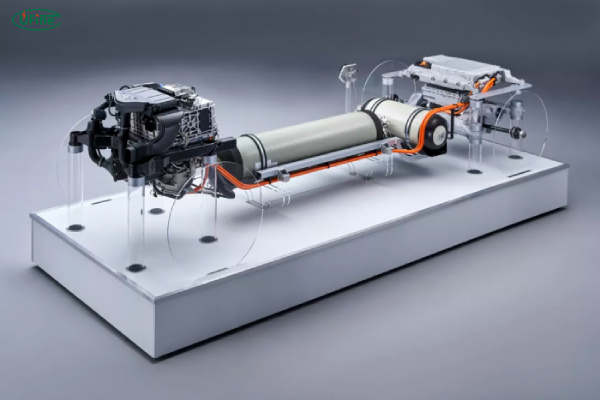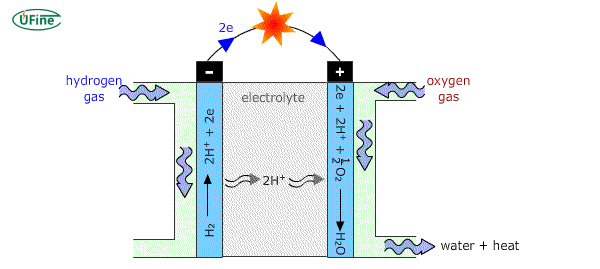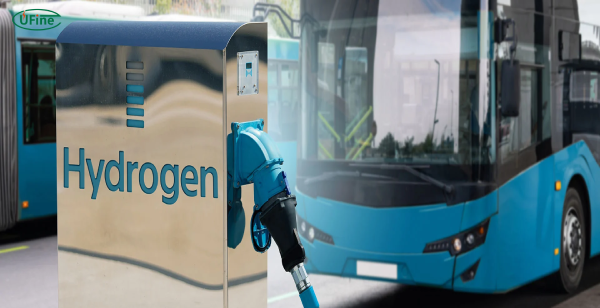As industries and governments seek cleaner alternatives to fossil fuels, hydrogen batteries have the potential to reshape energy storage, power transportation, and even stabilize power grids.
But what exactly are hydrogen batteries? How do they work, and why are they being touted as a vital part of the future energy mix? This article delves into the current landscape of hydrogen batteries, their advantages, applications, and how they compare with other technologies like lithium-ion batteries. We’ll also examine the challenges that must be overcome to scale hydrogen technology and its role in creating a cleaner, more sustainable world.
Part 1. What is a hydrogen battery?

A hydrogen battery, technically a hydrogen fuel cell, is a type of clean energy system that generates electricity through a chemical reaction between hydrogen and oxygen. The key advantage? Water vapor is the only byproduct. No harmful emissions, no air pollution, just pure energy.
In essence, hydrogen batteries work by splitting hydrogen molecules into protons and electrons. The electrons create an electric current that can be used to power electric vehicles (EVs), backup power systems, and more. The protons, on the other hand, pass through a membrane and combine with oxygen to create water at the other end of the fuel cell.
This means that hydrogen batteries provide a cleaner, renewable, and highly efficient way of producing electricity. Unlike lithium-ion batteries that need to be recharged, hydrogen batteries can be refueled almost instantly, making them a potentially transformative solution for a wide range of industries.
Part 2. How do hydrogen batteries work?
The technology behind hydrogen batteries is based on electrochemical reactions—similar to what happens inside a traditional battery but with key differences.
The Process of Generating Power:
-
Hydrogen Gas: Hydrogen, typically stored in high-pressure tanks, enters the fuel cell at the anode (the negative side of the cell).
-
Splitting the Hydrogen: At the anode, a catalyst splits the hydrogen molecules into protons (positively charged hydrogen ions) and electrons.
-
Electric Current Creation: The electrons are forced to travel through an external circuit, generating an electric current. This is the electricity that powers the device (such as a car, bus, or backup generator).
-
Protons Pass Through Electrolyte: Meanwhile, the protons (hydrogen ions) pass through the electrolyte membrane to the cathode (the positive side of the cell).
-
Reaction with Oxygen: Finally, the protons and electrons meet with oxygen at the cathode, forming water and releasing heat in the process.
The beauty of hydrogen fuel cells lies in their efficiency and environmental friendliness. Unlike conventional combustion engines or even lithium-ion batteries, they don’t produce toxic byproducts. The only waste is water.
Part 3. Advantages
1. Zero Emissions
As the world grapples with the urgent need to reduce carbon emissions and curb global warming, hydrogen batteries shine as a clean energy source. When used in vehicles or stationary power systems, they produce no emissions—only water vapor—making them an environmentally responsible choice.
Given the push for carbon neutrality in many industries, hydrogen batteries offer a tangible solution to the pressing problem of air pollution and greenhouse gas emissions.
2. Fast Refueling Times
One of the most exciting aspects of hydrogen batteries is their quick refueling time. While it can take hours to recharge lithium-ion batteries, hydrogen fuel cells can be refueled in just 3 to 5 minutes. This is crucial for applications like transportation, where refueling speed can make or break the practicality of an energy solution. The ability to refuel quickly makes hydrogen-powered vehicles, such as cars, buses, and trucks, far more convenient than electric vehicles, where charging stations are still limited and take much longer.
3. High Energy Density
Hydrogen has a high energy density, meaning that hydrogen fuel cells can store a significant amount of energy in a compact form. This is particularly beneficial in sectors like transportation, where long range and weight efficiency are critical.
For example, hydrogen-powered vehicles can travel hundreds of miles on a single refuel, far outpacing many battery electric vehicles (BEVs) that are limited by the size of their lithium-ion battery packs.
4. Long Lifespan and Durability
Hydrogen batteries have a longer lifespan than traditional batteries. They can withstand more charge-discharge cycles and maintain their performance over a greater number of years. This makes them particularly appealing for heavy-duty applications, such as electric buses and large trucks, which require more durability.
Part 4. Applications
As the world pushes for renewable energy solutions and a transition away from fossil fuels, hydrogen batteries are becoming increasingly relevant. They are already being deployed in several key sectors:
1. Transportation (Hydrogen Vehicles)
Hydrogen-powered vehicles are a clean alternative to traditional gasoline and diesel cars. Companies like Toyota, Hyundai, and Honda have already launched hydrogen-powered cars, which offer zero-emission driving with the same range and refueling convenience as conventional vehicles. Hydrogen fuel cells can power everything from light-duty cars to heavy trucks.
Hydrogen buses and trains are also being deployed in various parts of the world, including Europe and Asia, as part of efforts to reduce transportation emissions. In regions where electric vehicle charging infrastructure is still underdeveloped, hydrogen vehicles offer a strong alternative.
2. Energy Storage and Backup Power
Hydrogen batteries also offer a game-changing solution for energy storage. For renewable energy sources, such as solar and wind, which can be intermittent, hydrogen fuel cells provide a means of storing excess energy when the wind is blowing or the sun is shining and releasing it when demand is higher or production is low.
In addition, hydrogen fuel cells are being used for backup power in homes, businesses, and remote locations. As power outages become more frequent, especially with climate-related disruptions, hydrogen-powered generators can provide reliable, sustainable electricity.
3. Industrial and Commercial Use
Beyond vehicles and backup power, hydrogen batteries are increasingly being considered for industrial applications. This includes off-grid energy solutions, warehouse logistics, and even data centers that require high reliability and clean energy.
Part 5. Hydrogen battery vs. lithium battery
Though hydrogen batteries offer numerous advantages, lithium-ion batteries continue to dominate the market, especially in consumer electronics and electric vehicles. Let’s take a closer look at how they compare in today’s landscape:
| Feature | Hydrogen Battery | Lithium Battery |
|---|---|---|
| Energy Density | High – ideal for heavy-duty use and long-range vehicles | Moderate – good for small devices and short-range vehicles |
| Charging/Refueling Time | Quick – 3-5 minutes | Slow – can take hours to recharge |
| Environmental Impact | Zero emissions, water as byproduct | Manufacturing emissions, but low in use |
| Infrastructure | Requires refueling stations, limited availability | Widespread charging stations |
| Cost | High upfront cost, but decreasing | Relatively low cost and widely available |
| Longevity | Longer lifespan, more cycles | Shorter lifespan, fewer cycles |
Conclusion:
Hydrogen batteries hold a unique position in the energy storage landscape, offering superior refueling times, higher energy density, and zero emissions. They aren’t yet as widely adopted as lithium-ion batteries, primarily due to infrastructure and cost challenges. However, with continued technological advancements and growing investments, hydrogen could become a mainstream energy solution in the near future.
Part 6. The future of hydrogen batteries: what’s next?
The future of hydrogen batteries is incredibly promising but still facing hurdles. Infrastructure development, especially the building of hydrogen refueling stations, remains a key challenge. However, global efforts to reduce emissions and support clean energy are likely to accelerate the deployment of hydrogen technologies. As hydrogen production becomes cheaper and more efficient, the barriers to adoption will continue to fall.
In the coming years, hydrogen could play a pivotal role in decarbonizing industries like transportation, energy storage, and power generation—ushering in a new era of sustainable energy for the world.
In conclusion, hydrogen batteries represent an exciting and sustainable future for energy storage, offering advantages like zero emissions, quick refueling, and high energy density. The push for clean energy solutions and the rapid development of hydrogen technologies will likely see hydrogen batteries become an integral part of a greener, more efficient world.
Related Tags:
More Articles

How to Choose the Best Floor Scrubber Battery for Commercial Cleaning?
Selecting the ideal floor scrubber battery ensures a long runtime, rapid charging, and minimal maintenance for efficient commercial cleaning operations.
Battery for Blower vs Battery for Leaf Vacuum: Which One Should You Choose?
Battery for blower vs leaf vacuum—learn the key differences in power, fit, and runtime to choose the right battery for your outdoor tool needs.
How to Choose the Right Battery for Blower?
Choosing the right blower battery? Consider voltage, capacity, chemistry & usage. This guide helps match the best battery for peak performance.
How to Choose the Best Insulated Battery Box for Lithium Batteries?
Choosing the Best Insulated Battery Box for Lithium Batteries? Discover key factors such as size, material, and safety for optimal protection and performance.
7 Critical Elements on a Lithium Battery Shipping Label
What must be on a lithium battery shipping label? Learn 7 key elements to ensure safety, legal compliance, and correct handling across all transport modes.





